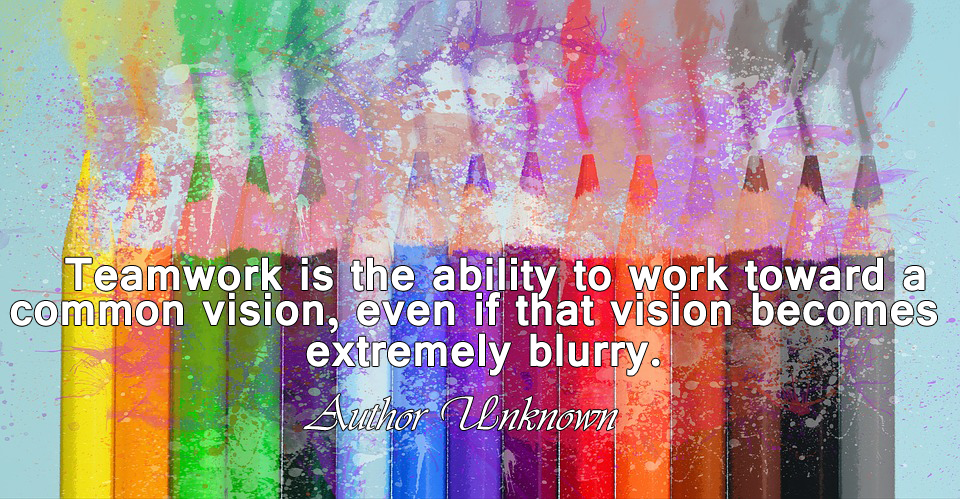Take a moment to look at a handful of job postings on a job site. Go ahead, I’ll wait…chances are you’re going to see something along the lines of “dynamic company looking for a team player”. So essentially, someone who enjoys working with others, is hardworking, supportive and encouraging, and likes to high-five people.

But not everyone buys into the rah-rah vision of teamwork. Working with other people can be a pain in the butt. Like working with a power-tripping leader who loves giving you the crappiest assignments, a cynic who vetoes everything and spouts dire warnings of the project failing and the world ending, or that guy who talks a good talk, but you’ve never actually seen him do any work.
People who have had nightmare-worthy teammate experiences cringe at the thought of working on a team project, leaving many talented, hard-working employees wishing they could work alone. It also means that some perfectly good job candidates are passed over simply because they prefer to fly solo. But there’s a huge difference between a “lone wolf” (someone who works best on their own and has legitimate concerns for eschewing teamwork) and a “lone sheep” in wolf’s clothing (someone who lacks the confidence to work with others). Here’s what I mean:
We analyzed data from 18,812 who took our Team Player Test and singled out two groups: Top-performing and poor-performing employees who prefer to work alone. While both groups had misgivings about working with others, the reasons why they hate teamwork differed significantly. The following is a list of pet peeves where top performers scored higher (i.e. they found these teamwork issues much more annoying than the poor performers did):
PET PEEVES OF TOP-PERFORMING LONE WOLVES
Unfair workload
(Note: scores range from 0 to 100)
- Score for top performers: 81
- Score for poor performers: 59
Why it’s so peeving (yup, it’s a word):
- It’s often the result of working with someone who doesn’t pull their own weight because a) they lack the skills/knowledge to do the job, b) they’re lazy, or c) they’ve mastered the ability to put in the bare minimum amount of work and/or pawning off their work on someone else.
- It often means that you and other team members will need to pick up the slack.
- The extra workload means overtime and taking work home.
Having to depend on others
- Score for top performers: 73
- Score for poor performers: 55
Why it’s so peeving:
- Having to depend on others to get their part of a project done could result in major delays. And if they’re part isn’t done well, it could cause the entire project to fail.
- Sometimes, if you want to get something done right, you have to do it yourself.
- Your team is only as strong as its weakest member.
Lack of full control over a project
- Score for top performers: 67
- Score for poor performers: 49
Why it’s so peeving:
- Working on a team means you get to share the brunt of the responsibilities. It also means you have to reach a consensus on decisions – and just like jury duty, it doesn’t end until everyone agrees.
- You may not be able to dictate how to approach the project, or which tasks you get to take on.
- If the project fails you all fail, even if you weren’t directly responsible for the failure.

Lack of role clarity
- Score for top performers: 70
- Score for poor performers: 59
Why it’s so peeving:
- If a team leader isn’t appointed, you’ll need to figure out as a group who does what, when, why, and how.
- You may get stuck with a task that you lack the knowledge, skills, and experience to complete.
- Role ambiguity causes delays, disorganization, errors, omissions, and even power struggles.
Not getting due credit
- Score for top performers: 56
- Score for poor performers: 46
Why it’s so peeving:
- Working on a team means sharing the glory of a successful project, even if you’re the one who worked the hardest or single-handedly saved everyone’s butt with a brilliant idea, you genius you.
- Your contributions, however awesome, may not be singled out.
- You’re rewarded as a team. So if that means free Pizza on Friday even though you hate pizza, there may not be much you can do.
When it comes to the pet peeves where the poor performers scored higher, they seemed to center around one common theme: Self-doubt. Poor performers were more likely to avoid teamwork because:
- They feel that their skills are inferior to those of their teammates (score of 45 vs. 27 for top performers).
- They are worried that they won’t live up to their teammates’ expectations or that their part of an assignment will be the reason why the whole project fails (score of 50 vs. 32 for top performers).
- They are afraid of having their work criticized (score 43 vs. 37 for top performers).
- They are afraid of looking like an idiot if they speak up in front of the group (score of 40 vs. 34 for top performers).
- They are not comfortable interacting with other people (score of 54 vs. 49 for top performers).
Here are some tips to dealing with these teamwork pet peeves, whether you’re a lone wolf or maybe more of lone sheep in wolf’s clothing:

- Connect with your teammates on an individual basis. If you’re shy or are not used to interacting with a large group of people, the social aspect of teamwork can be really intimidating. Start small. Talk to each of your teammates individually, like at lunch. As you get to know each person (along with their quirks), you’ll feel more at ease (or at least will be more prepared) interacting with them as a group.
- Focus on the message when someone gives you negative feedback. Provided that the person giving feedback is genuine, chances are the criticism is meant to help you improve. Therefore, take a deep breath, swallow any defensiveness, and try to see where the criticism might have merit.
- Focus on your strengths. Volunteer to take on tasks you know you are good at. This may help you feel more capable and confident. At the same time, work on your weak skills by observing and working with more skilled people.
- Accentuate the good in others. Learn to note and appreciate what your teammates HAVE done or accomplished. And be patient with others. Realize that not everyone works at the same speed. Learn to encourage without being demanding or unreasonable. You will feel more relaxed and your teammates’ appreciation for you will increase.
- Understand the nature of group work. Sure, working with others takes more organization and planning, and more time debating. However, because there are more hands to work on a project, work can often proceed quickly once the planning stages are complete. The wider perspective can also benefit the overall quality of the project
- Have a strategy meeting early on. Before tackling a project, call a meeting to define all the details of the project. Spending time on this step not only helps start the project out right, but it gives you time to assign roles and divvy up the necessary tasks.
Insightfully yours,
Queen D

